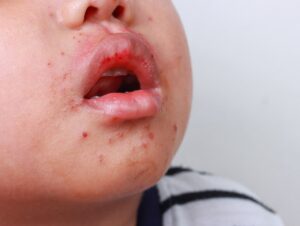Offering Hand Foot Mouth Treatment For Your Little Ones
Have you noticed red spots on your child’s hands and feet, along with painful sores in their mouth?
Or has your little one been less active and refusing to eat over the past few days?
These could be signs of hand, foot, and mouth disease (HFMD), a common viral illness in children.
Don’t worry! Family Urgent Care is here to help.
From accurate diagnosis to personalized treatment, our experienced healthcare providers are committed to your child’s recovery.
We’re open 7 days a week, and you can either schedule an appointment or walk in anytime for prompt care.
What is Hand, Foot And Mouth Disease?
Hand, foot, and mouth disease (HFMD) is a highly contagious viral illness, most commonly caused by the coxsackievirus. It primarily affects young children, especially during the summer and fall seasons.
After exposure, symptoms usually appear within 3 to 6 days; this is known as the incubation period.
Read More: Myths and Facts About Hand Foot and Mouth
What Causes HFMD In Young Children?
HFMD is usually caused by the coxsackievirus A16, a member of the non-polio enterovirus group.
Other viruses, such as coxsackievirus A6 and enterovirus 71, can also lead to hand, foot, and mouth disease.
This illness is highly contagious and spreads through contact with an infected person’s:
- Saliva or nasal secretions (from sneezing, coughing, or nose wiping)
- Stool (for example, during diaper changes)
- Blister fluid or skin contact
- Shared cups, utensils, or toys
- Contaminated surfaces (like doorknobs, play mats, or classroom supplies)
Children are especially at risk in daycare settings or schools, where germs spread easily through close contact.
What Are Some Common Symptoms Of HFMD?
If your child has HFMD, you might notice the following concerning symptoms:
- Fever (usually between 101°F or 102°F for the first few days)
- Painful blister-like lesions inside the mouth (gums, tongue, and inner lips)
- Small, oval or white blisters on the palms and soles
- Sore throat
- Fatigue
- Loss of appetite
Many children become fussy, refuse to eat or drink, and may drool more than usual due to the pain from mouth sores.
At Family Urgent Care, our healthcare providers can examine your child, offer fast relief through appropriate medications, and guide you on home care tips to speed up recovery.
How Can You Prevent Hand-Foot-And-Mouth Disease?

You can even prevent this contagious disease by taking some small precautionary measures at home. Here are some preventive actions you can take right now!
- Wash your hands frequently for at least 20 seconds, especially after using the toilet or changing a diaper.
- Educate your children on proper hygiene.
- Disinfect common areas accessible to kids, such as toys and doorknobs.
- Avoid close contact with your child and people who are sick
How Does Family Urgent Care Treat HFMD?
There is no specific vaccine or treatment, as symptoms typically resolve within 7 to 10 days. However, certain medications are prescribed to relieve symptoms and alleviate discomfort.
- Over-the-counter pain medications like ibuprofen or acetaminophen
- Topical anesthetics to relieve mouth sore pain
- Adequate fluid intake is essential.
When To See A Healthcare Provider For HFMD?
While symptoms typically resolve on their own, certain situations warrant immediate medical attention. You can visit Family Urgent Care as soon you come across the following concerns in your child:
- Not drinking fluids normally or has loss of appetite
- Fever lasting for more than 3 days
- Your child has a weakened immune system
- Your child is younger than 6 months
- You notice any symptoms of Hand, Foot, and mouth diseases such as blisters in the mouth, palm, and soles.
- If the symptoms are not improving within 3 to 10 days
In such cases, Family Urgent Care clinics provide urgent care services with experts offering immediate and definitive care for HFMD. We offer walk-in consultations and even online/telehealth/video appointments.
Frequently Asked Questions
Yes, it is possible to get HFMD more than once. Although the body builds immunity to the specific virus that caused the infection, other strains of the virus can still cause reinfection, especially in young children.
No, HFMD and impetigo are different conditions. HFMD is a viral infection that causes blisters on the hands, feet, and inside the mouth. Impetigo is a bacterial skin infection that usually causes yellow, crusty sores around the nose and mouth. A healthcare provider can help tell them apart and recommend the right treatment.
Some Lysol disinfectant sprays and wipes can kill viruses that cause HFMD but only if they are EPA-registered and specifically labeled as effective against enteroviruses. Always follow product instructions and disinfect high-touch surfaces like toys, doorknobs, and tables.
Yes, properly chlorinated water (like in swimming pools) can kill many viruses, including those that cause HFMD. However, the virus can still spread through person-to-person contact around pool areas, especially if hygiene is poor. It's important to wash hands and avoid close contact if someone is infected.

